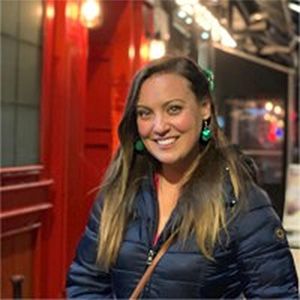
ACP delivers curriculum programmes that include subject-specific professional development for teachers for use in Ark’s network of schools and beyond. These curriculum programmes are built on evidence-based research and are designed by teachers and education experts. The goal is to ensure students build on their knowledge from subject to subject and cumulatively from year to year.
In our second instalment of Meet the Curriculum Creator, we talk to Margaret O’Shea, Ark’s director of music. She is one of the few UK-based practitioners to hold an artist-teacher accreditation and regularly works with other arts organisations. In March of 2019, she was invited to join the faculty of the music education department of Rutgers University, New Jersey as a guest expert in inclusive practice.
Tell us about what you do.
I am the Director of Music for Ark schools and my position is to lead Ark’s music curriculum and enrichment programmes. There isn’t really such thing as a standard day in my life – it can range from teaching a class or leading a rehearsal, to arranging music, or even writing a board paper.
What is the Ark Music Programme and its aim?
The Ark Music programme aims to unlock every child’s artistic potential, regardless of their background or starting point. Through our suite of curriculum and enrichment programmes, we want to ensure that every pupil in an Ark school has the skills, knowledge and access they need, to succeed as musicians. We also want them to have the belief and confidence that they’re entitled to.
Why is music education important?
Music is uniquely placed in its ability to stimulate personal, emotional and intellectual development, and motivate social change. We’re all musicians, and artistic expression is a core part of the human experience, but sadly, we know that huge educational inequality exists and that it is nowhere more evident than when it comes to the arts and, in our case, music.
What advice would you give to students who feel they have no aptitude for music?
Music is hard but you should enjoy that challenge. It requires so much of you at every step of the way, regardless of the genre and whether you’re a professional or just starting out. Certain things definitely get easier as you become more technically proficient, but that’s really only the tip of the iceberg.
As my teacher used to say, ‘any monkey can play music, but very few can make music’ and he was right. I still play some of the same pieces I first encountered when I was in school and while I approach most of them with relative technical ease now, my relationship to those pieces has evolved hugely in the intervening years. So my advice is ‘stick with it’. Expressing yourself and baring your soul through any art form is never going to be simple, but it does become increasingly satisfying, enriching and ultimately it is deeply rewarding on a level I can’t imagine matches much else.
What is one album you think everyone should listen to?
I couldn’t say – we each have a connection with music that is unique and constantly shifting, sometimes on a daily basis – and that’s the beauty of it. But if you’re asking what I’m currently enjoying, well, I’ve recently rediscovered The Gloaming’s eponymous album and I’m enjoying it all over again. I love how they play with melody, texture and instrumentation to create something that’s both familiar and new. I would highly recommend it.
Read the first instalment of Meet the Curriculum Creator with Nick Wallace, the Director of English Mastery, here.
To find out more about the Ark Music Programme, follow this link.